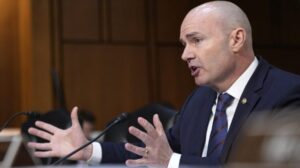Congress
Updated megabill includes key compromises on taxes and Medicaid
Senate Republicans have included compromises on key Medicaid and tax issuesin updated text for their sweeping domestic policy bill.
In an effort to placate GOP moderates on the fence on the legislation, Senate Republicans are planning to provide a $25 billion stabilization fund for rural hospitals over five years. It’s a significant bump up from the $15 billion offer Senate Republican leadership had made to a group of Medicaid moderates, who have balked at the steep cuts to the health program contained in the marque legislation.
Senate Republicans would also delay planned cuts to provider taxes that fund state obligations to Medicaid. The changes would still incrementally lower the allowable provider tax in Medicaid expansion states from 6 percent down to 3.5 percent.
But the drawdown would begin in 2028, one year later than planned — in a nod to concerns from senators like Sen. Thom Tillis (R-N.C.), who warned this week that resulting cuts to Medicaid could have disastrous electoral consequences in the midterms.
The changes come as Senate Republicans are racing ahead with plans to hold a vote on their legislation Saturday. President Donald Trump still wants the bill on his desk by July 4, though Republicans, as of Friday evening, did not have the votes to start debate.
The language also reflects changes to the state and local tax deduction sought by blue state House Republicans. The New York, New Jersey and California Republicans have been in prolonged negotiations with Sen. Markwayne Mullin (R-Okla.) and Treasury Secretary Scott Bessent over a boost to the deduction, which Senate Republicans universally want lowered.
The new Senate text keeps House Republicans’ plan to increase the deduction from $10,000 to $40,000, but it would snap back to current levels after 2029. The new language likely shaves off at least $100 billion from the approximately $350 billion price tag of the House plan.
It’s still unclear, though, if the compromise would get all of the hardcore SALT Republicans to “yes.” In a Friday lunch with Senate Republicans, House Speaker Mike Johnson said he still had one holdout on the SALT deal -— a likely reference to Rep. Nick LaLota (R-N.Y.), who indicated on Friday that, if there had been a deal, he was not part of it.
The text for the Finance committee, which has jurisdiction over tax policy and Medicaid, could still see major changes. That’s because the language still hasn’t been fully updated to reflect rulings from the parliamentarian, Elizabeth MacDonough, on whether the contained provisions comply with strict budget rules.
The tax panel had their final meetings with MacDonough Friday night, but it’s unclear how she would weigh in, if at all, on tax provisions enacted under a novel accounting tactic called “current policy baseline. That tactic takes the unprecedented step of zeroing out trillions of tax cut extensions. Senate Republicans are relying on it to make a slew of provisions, from individual to business tax cuts, permanent.
David Lim contributed to this report.
Congress
‘Kill shot’: GOP megabill targets solar, wind projects with new tax
Senate Republicans stepped up their attacks on U.S. solar and wind energy projects by quietly adding a provision to their megabill that would penalize future developments with a new tax.
That new tax measure was tucked into the more than 900-page document released late Friday that also would sharply cut the tax credits in the Inflation Reduction Act for solar and wind projects. Those cuts to the IRA credits were added after a late-stage push by President Donald Trump to crack down further on the incentives by requiring generation projects be placed in service by the end of 2027 to qualify.
The new excise tax is another blow to the fastest-growing sources of power production in the United States, and would be a massive setback to the wind and solar energy industries since it would apply even to projects not receiving any credits.
“It’s a kill shot. This new excise tax on wind and solar is designed to fully kill the industry,” said Adrian Deveny, founder and president of policy advisory firm Climate Vision, who helped craft the climate law as a former policy director for Democratic Senate Leader Chuck Schumer.
Analysts at the Rhodium Group said in an email the new tax would push up the costs of wind and solar projects by 10 to 20 percent — on top of the cost increases from losing the credits.
“Combined with the likely onerous administrative reporting burden this provision puts in place, these cost increases will lead to even lower wind and solar installations. The impacts of this tax would also flow through to consumers in the form of higher electricity rates,” Rhodium said.
The provision as written appears to add an additional tax for any wind and solar project placed into service after 2027 — when its eligibility for the investment and production tax credits ends — if a certain percentage of the value of the project’s components are sourced from prohibited foreign entities, like China. It would apply to all projects that began construction after June 16 of this year.
The language would require wind and solar projects, even those not receiving credits, to navigate complex and potentially unworkable requirements that prohibit sourcing from foreign entities of concern — a move designed to promote domestic production and crack down on Chinese materials.
In keeping with GOP support for the fossil fuel industry, the updated bill creates a new production tax credit for metallurgical coal, which is used in steelmaking.
Congress
Elon Musk renews megabill attacks
Elon Musk is once again bashing the Republican megabill.
Weeks after an initial tirade against the legislation, the former top White House staffer and current richest man in the world wrote Saturday on X that the “latest Senate draft bill will destroy millions of jobs in America and cause immense strategic harm to our country!”
“Utterly insane and destructive,” he added. “It gives handouts to industries of the past while severely damaging industries of the future.”
The bill significantly cuts subsidies for clean power sources like wind and solar, along with tax credits for buying electric vehicles and instead includes incentives for the coal industry.
Musk has intervened before to tank a major spending bill. The billionaire torpedoed a compromise government spending bill in December by repeatedly posting in opposition to it. This caused a number of Republicans to back away and nearly spaked a government shutdown.
At the time, Musk had far more influence as a close Trump ally and as the largest donor in support of Trump’s re-election bid. His influence in the GOP has waned after his controversial stint atop the Department of Government Efficiency initiative created repeated hassles for the White House.
Congress
House could vote on megabill as soon as Tuesday
House Majority Leader Steve Scalise told GOP members on a Saturday conference call to prepare for votes Tuesday evening or Wednesday on the sweeping Republican megabill, according to three people who were on the call and were granted anonymity to describe it.
Scalise and Speaker Mike Johnson addressed House Republicans as GOP leaders in the Senate raced to tweak and advance their version of the megabill. Johnson said on the call he has been working with Senate Republican leaders to shape the bill so the version that emerges from the other chamber can be passed in the House without changes and sent to President Donald Trump for enactment.
The leaders have been planning to iron out some issues in a final amendment before Senate passage, but Senate GOP leaders have pushed back hard on reversing deep Medicaid cuts — something dozens of House Republicans are concerned about.
Johnson also members to bring any remaining concerns directly to their GOP senators and to the White House — and to not air those grievances in public. House GOP leadership said they would stick with a promise to give members 48 hours notice of a vote so that lawmakers have adequate time to return to Washington.
House GOP leaders did not take questions on the call.
-

 The Josh Fourrier Show8 months ago
The Josh Fourrier Show8 months agoDOOMSDAY: Trump won, now what?
-
Uncategorized8 months ago
Bob Good to step down as Freedom Caucus chair this week
-

 Politics8 months ago
Politics8 months agoWhat 7 political experts will be watching at Tuesday’s debate
-

 Politics8 months ago
Politics8 months agoHow Republicans could foil Harris’ Supreme Court plans if she’s elected
-
Economy8 months ago
Fed moves to protect weakening job market with bold rate cut
-
Economy8 months ago
It’s still the economy: What TV ads tell us about each campaign’s closing message
-

 Politics8 months ago
Politics8 months agoRFK Jr.’s bid to take himself off swing state ballots may scramble mail-in voting
-
Uncategorized8 months ago
Johnson plans to bring House GOP short-term spending measure to House floor Wednesday








